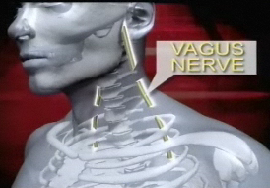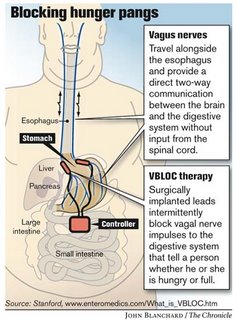Vagotomy: Is cutting the vagus nerve the answer to weight loss?

Las Vegas, NV
Last year, 200,000 Americans had weight loss surgery and while gastric bypass surgery can significantly reduce weight, the surgery comes with risks.
Now a procedure that was once commonly used to treat ulcers is being tested as a safe alternative to weight loss surgery.
Action News reporter Kimberly Tere has the details.
The vagus nerve controls your feeling of hunger.
Some even say every single thing the vagus nerve does is designed to make you gain weight.
That is why San Francisco Doctor Robert Lustig is testing laparoscopic vagotomy, a surgery in which the vagus nerve is cut.
Cutting the vagus nerve can reduce the amount of fat stored in the body and can increase energy levels.
"Every patient in the study said their hunger was gone, just gone. One comment I got from one patient was this is the first time in her life that she was not a prisoner to food," said Dr. Lustig.
It worked for Garth Michaels who after years of standing out, ballooned up to 340 pounds.
"I was eating the wrong stuff. I was eating too much of it. I was eating too fast and I was not exercising," said Garth.
Garth decided to stand up and wage a battle against the bulge.
"Moving would hurt, it just hurt and my ankles could not take my weight," explained Garth.
After 20 years of battling the physical and mental strains of obesity, Garth had a vagotomy done.
With the help of the procedure and exercise, Garth lost more than 100 pounds.
"When I started exercising all of a sudden, you know I was doing it three or four times a week and the switch turned on," said Garth.
Now a study is underway to find out whether it is a viable alternative to the traditional gastric bypass.
15 patients have had vagotomies done at University of California at San Francisco Medical Center.
One of the main differences is a vagotomy only takes 20 minutes under conscious sedation with a breathing mask or under general anesthesia.
It is also an outpatient procedure.
On the other hand, gastric bypass generally takes four hours to perform and requires a hospital stay of at least three days.
Now two years after having the vagotomy done and after a lifetime of hiding under big clothes, Garth is finally comfortable in his own skin.
"I would say I look in the mirror right now and feel 75% better than when I looked in the mirror before," said Garth.
The majority of the patients who underwent vagotomy lost weight and were able to keep it off.
But for others, there was little or no effect.
While hunger was curbed, Dr. Lustig says they kept eating out of stress or habit.
"This is not a procedure for the reward pathway or for the stress pathway. It seems to be a procedure strictly related to hunger," said Dr Lustig.
Patients in the study did lose an average of 20% of their weight.
For Garth it was a life altering surgery that gave him the push he needed to win the battle on weight for good.
The vagotomy is still experimental when it comes to being used for weight loss.
Dr. Lustig says more research needs to be done before it is ready for widespread use.



